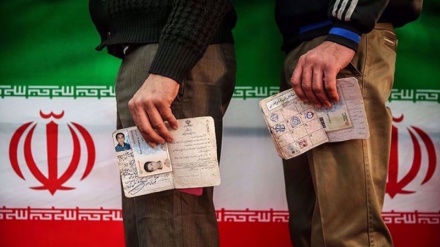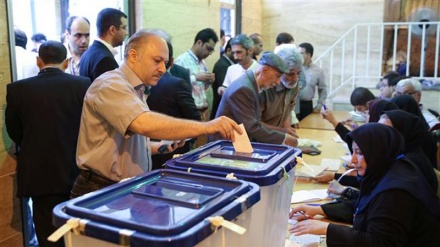Elections: Electoral system in Iran guarantees election’s health
Based on the outlook of the sacred Islamic system, people maintain the right to vote.
The importance of presence and participation of people in elections, and the necessity to protect and safeguard people’s votes have always been underlined in the remarks of the Founder of Islamic Republic of Iran, late Imam Khomeini (God bless his soul), and the Leader of Islamic Revolution, Ayatollah Seyyed Ali Khamenei.
Late Imam Khomeini referred to holding of elections as one of the basic rights of any given nation, for determination of their own fate and the type of the ruling system which governs them.
In the view of late Imam, authority should be granted to people, and any prudent individual accepts that people should be able to take their destiny in their own hands. This is the law, based on wisdom and human rights.
Late Imam also pointed out and reminded that the Islamic government is a truly democratic government, and religious minorities have been granted complete freedom; and anyone can express his views. The Islamic government has logically responded to all logics.
In further remarks, the Founder of Islamic Republic of Iran said the people who voted for the Constitution want the full implementation of the Constitution.
Meanwhile, in the view of the Leader of Islamic Revolution, the implementation, and supervision of elections, the rights of candidates, electoral lists, protection of people’s votes, and acceptance of the outcome of elections maintain highly meaningful aspects.
In a speech delivered by the Leader of Islamic Revolution, he pointed out: “The individuals who elect the Leader, or write the law or the one who is bound to be elected as the chief executive should maintain a number of conditions and qualifications. Now, who should recognize these qualifications? Isn’t there need for an organization to carry out this task? Obviously there is need for such an organization, which in fact is the Guardian Council.”
Throughout June 2009 elections, the Leader of Islamic Revolution, in an address to worshippers attending Friday Prayers, strongly rejected submission to illegal demands, after the nefarious sedition which emerged in order to somehow annul the elections.
Protection of legal frameworks in order to safeguard immunity of elections was one of the talking points in the keynote speech, delivered by the Leader of Islamic Revolution.
The Leader of Islamic Revolution noted: “If some have doubts, these doubts should be studied only through legal channels. If the legal frameworks are shattered today, no election would be immune in the future.”
Emphasis on people’s rights on the verge of June 2013 presidential elections can also be considered as the integral part of the strong belief of the Leader of Islamic Revolution in safeguarding people’s votes.
The Guardian Council Spokesman, Abbas-Ali Kadkhodai, has pointed out: “The Leader of Islamic Revolution has always put emphasis on people’s right to take part in elections. Naturally, any political system should safeguard people’s votes. In the Islamic Republic of Iran, the right of people to vote has always been emphasized and underscored by the Founder of Islamic Republic of Iran, late Imam Khomeini (May his soul rest in peace), and the Leader of Islamic Revolution, Ayatollah Seyed Ali Khamenei. Naturally, this fact further reinforces and cements public trust toward the sacred Islamic establishment.”
The health of elections is secured via protection of people’s votes in elections.
Thus, the Constitution has found supervision of elections to be necessary for protection and maintenance of people’s votes.
The 99th Tenet of the Constitution points out: “The Guardian Council is duty-bound to supervise Assembly of Experts, Presidential, and Legislative Elections, as well as referendums.”
The supervision of Guardian Council on elections is carried out via supervisory boards. To this end two major duties, namely study of qualifications of candidates, and supervision on implementation of elections have been defined, which aim to reassure the voters and materialize the transparency of all phases of elections. Thus, all phases of elections, including registration of candidates, study of their qualifications, and the election campaigns of the nominees are precisely monitored by the observers of elections.
According to the 10th Article of Iran Election Law; elections are held directly and publicly. The 28th Article of this law notes: if the name of more than one candidate has been written and/or ticked on the ballot, that ballot is annulled. Also, in accordance with Article 29 of this law; the empty ballots boxes should be stamped and registered under the name of the related polling station in the presence of the representative(s) of the supervisory board, and a minute should be prepared prior to voting by the corresponding members of the polling station, in which the representative(s) of the related supervisory board certify the number of ballot boxes and their emptiness. Meanwhile, if throughout the election, need would arise for addition of another ballot box, the same procedure should be carried out, and a minute should be prepared.
Protection of people’s votes in elections manifests the observation of the highest standards of social and civil rights of the citizens, and further reinforces the pillars of democracy in the community.
MR/ME


